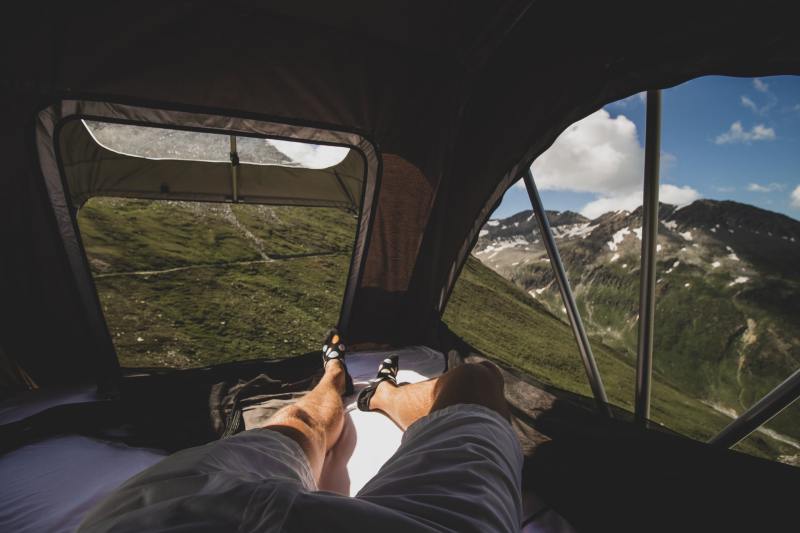
A night under the stars can be a truly magical experience. It allows you to relax, disconnect from a hectic schedule, and return to a more natural way of living — you can even turn your alarm off and let your body wake up with the sun. Regular campers know that sitting around a campfire and watching the flames dance, with a million stars all around you and a cold drink in your hand, is exactly as idyllic as it sounds. But for first-time campers, getting to this moment might feel a long way off.
Whether you’re looking to dip your toes into camping for the first time or you’re a seasoned pro trying to convince a partner or a buddy that camping is the ideal weekend getaway, that first experience can make or break a would-be camper. Use these camping hacks to kick off your camping career the right way and ensure your first time isn’t a washout.
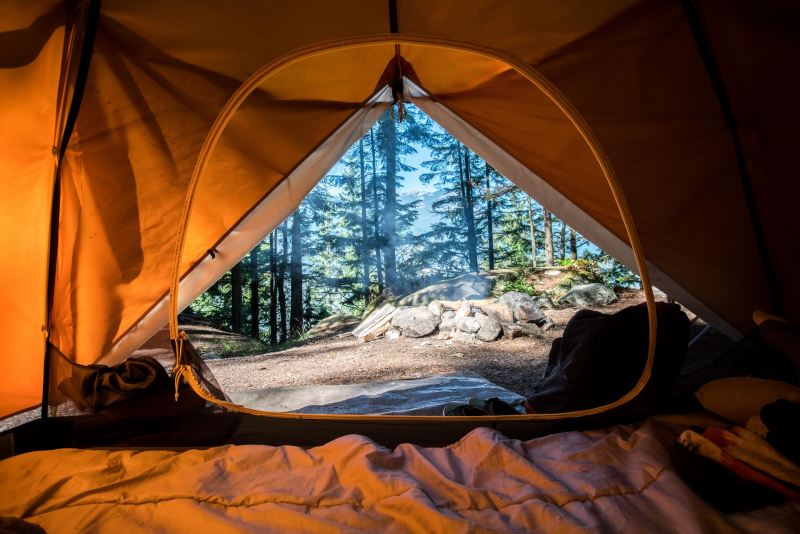
Give yourself some space
One of the most essential camping items is the right camping tent. Most first-time campers imagine sliding into a damp cocoon with barely enough space to move around, let alone get into their sleeping bag. Unless you’re planning to become a long-distance hiker and need a lightweight, space-saving tent, start by going big.
Give yourself some space inside the tent to stand and move around and take all your bags inside with you — not your food if you’re in bear country, though. Remember that a bigger tent will not be as warm as a smaller one and may not stand up against bad weather, though, so this advice should be balanced against other factors.
Take a camping tarp and give yourself a sheltered outdoor space away from your tent, or extend your tent’s porch to provide a shaded or dry area. Setting this up gives you a space to sit in the evening or to cook your meals — you should never cook in your tent. Practice putting up your tent and tarp at home before you head out camping and avoid a stressful start to your trip.

Get comfortable
A warm sleeping bag and a comfortable sleeping mattress are essential for a first-time camper to sleep properly and enjoy their time under the stars. The days of rolling out a blanket on the ground and feeling every bump are long gone, and with today’s technology, you can be almost as comfortable as you would be in your bed at home.
If you don’t fancy a sleeping bag, try a camping blanket instead, and don’t forget the inflatable pillow, too. When you’re not sleeping, a good set of camping furniture can get you up and off the ground and give you surfaces to cook on and rest your beer.
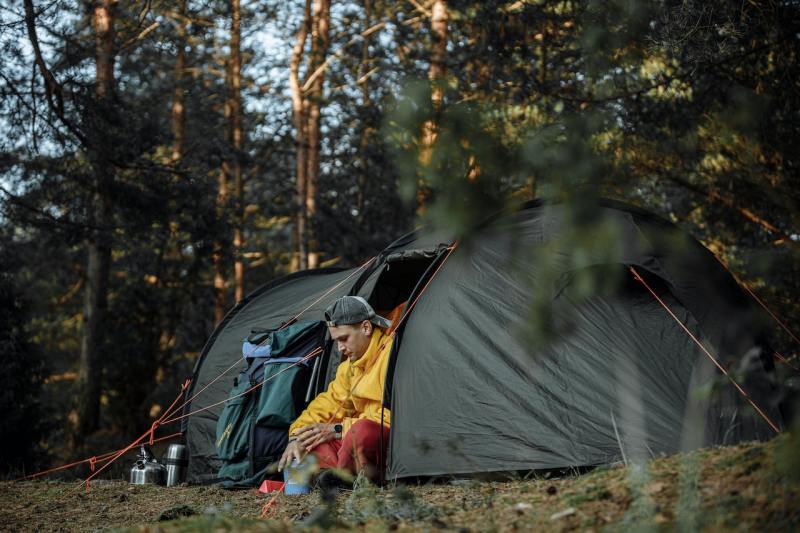
Take spares of everything and layer up
Layers are your friend when you’re camping. Your first camping experience should be comfortable, and this means you need to have plenty of camping clothing and equipment with you — probably far more than you need. As you probably aren’t going to venture too far from your car on this first trip, you can load up with spare jackets, fleece sweaters, and anything you might need to get warm when the temperatures go down in the evening. Once you get home, review what you used and didn’t use and pack accordingly next time.
Avoid cotton clothing at all costs when you’re camping. Synthetic or wool layers will still keep you warm even if they get wet and will also dry much faster when the sun comes out or when you’re around a campfire. You can pick up a couple of sets of synthetic base layers cheap enough, but if you’re serious about camping in the long run, Merino wool gives you a better warmth-to-weight ratio. An insulated jacket and a few thin fleeces should be on your list, too, as well as some wool socks and a complete set of waterproofs.
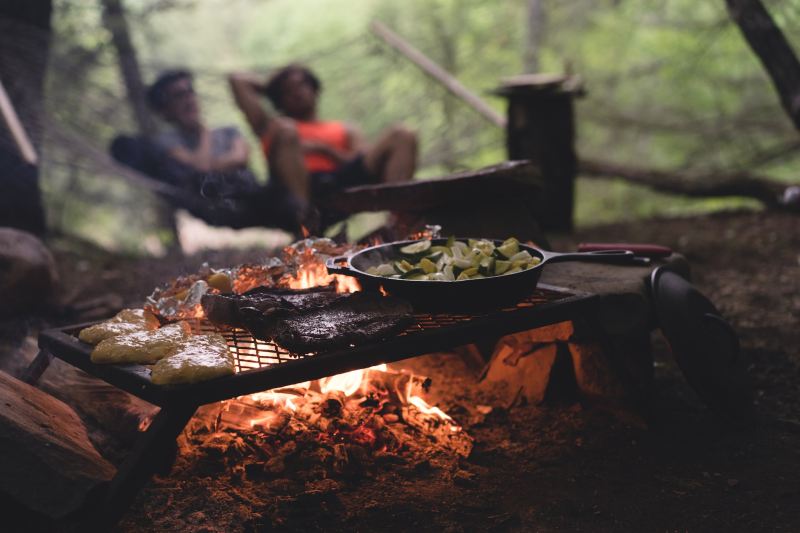
Calories are key
Your body will burn more calories when camping than it usually does at home, and you need to replenish these. One of the key mistakes many first-time campers make is to take meals that don’t have the nutritional value they need to keep themselves warm overnight. Whether you’re cooking on a camping stove or perfecting your campfire cooking, there are endless meal choices to elevate your camping experience.
A cooler full of good food and a few drinks is the quickest way to transform a rough-and-ready camping trip into the ideal weekend getaway. You can even pre-cook some meals — chilis, curries, or similar — and heat them on your stove or fire. That way, you have a hearty, warming meal without cooking from scratch. Why not wrap a potato in tin foil and heat it on the fire to have your chili over? Looking for a great breakfast? Pancake mix in a squeeze bottle is a mess-free way to make your favorite morning meal.
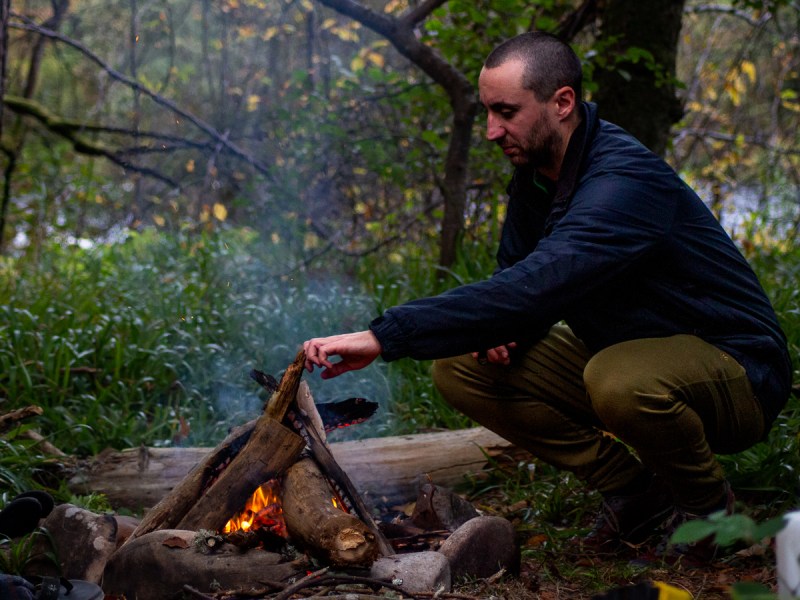
Fire it up
On that note, where would a camping trip be without a campfire? The roar and crackle of the flames, the heat, the glow that lights the area around you — it’s the camping experience. Before you set up your site, check whether you are allowed fires in the area — some parks have fire bans in place through the summer to help prevent wildfires — and whether you have to bring your own firewood with you.
A fire pit raises your fire off the ground and keeps it contained. Many campgrounds ask that you only have fires in a fire pit, which helps protect the environment around you and makes tidying up after yourself quicker and easier once your fire burns out. Some of the best fire pits have fans to help your fire get started or are specially designed to draw oxygen.
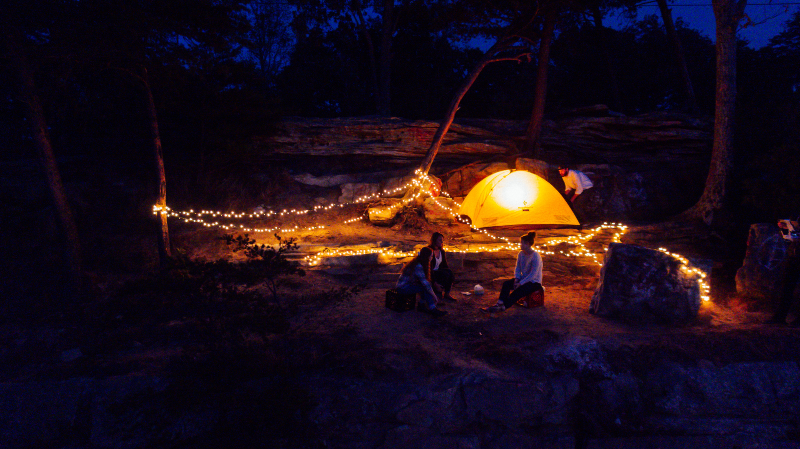
Light up your life
Don’t forget the illumination. There’s nothing worse than stumbling around your campsite in the dark. A couple of handheld flashlights or a headlamp or two is a great start, but these only really light the immediate area around you. Camping lanterns will give your campground a more comfortable and cozy feel than constantly relying on headlamps, and you’re far less likely to blind someone by shining it in their eyes.
Setting up a line around your campground — above head height — and stringing some LEDs around it is a beginner’s camping hack that gives your campground that glamorous feeling and makes it feel homier than a barren bit of woodland. If you don’t have a string of LEDs, you can always tie a knot periodically and hang a lantern to light the area. Many of these are even solar-powered lighting options so they can recharge themselves throughout the day.
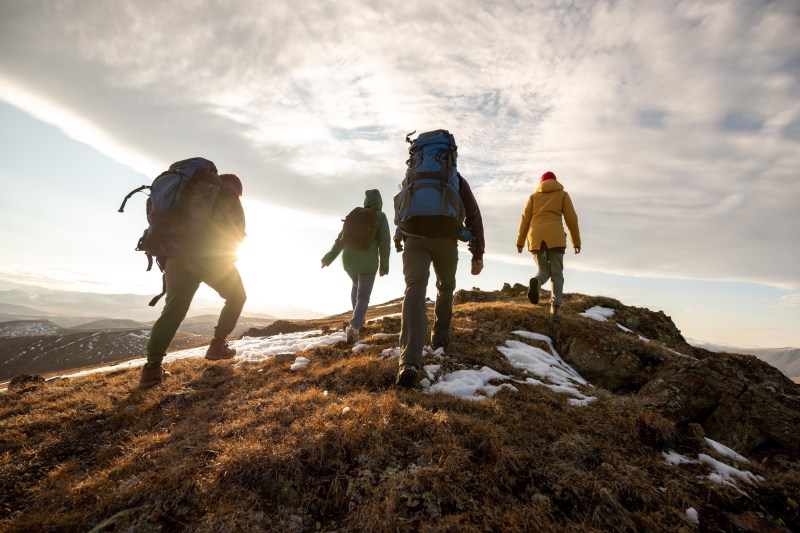
Plan some activities
Some people go camping to relax in nature and want nothing more than a camping chair, a cup of coffee, and the sounds of nature. But most people use camping to explore a new area and have a mini break. Make sure to do a little research before you go camping and find some local hiking trails or tourist attractions you might want to visit. Whatever your plans, make sure you pack a little light entertainment for in camp. Board games and books don’t rely on electricity and can keep you entertained even if you’re camping in the rain.

Take some power with you
Unless you’re looking at camping as a chance to disconnect fully, you’ll need a way to charge all these gadgets, lanterns, speakers, and other electronics, and you don’t want to rely on your truck battery. Sure, you could use small charging packs, but if you’re going to charge more than just a phone or two, you will want a proper backcountry charging setup.
Pre-charge these units before you head out; they’ll keep you going all weekend — much longer than that. For longer trips, pair them with a solar unit to keep yourself off-grid but charged up. These units are also great in the house in case of power outages at home due to storms, so look at these as a long-term investment.
Editors' Recommendations
- Tick safety 101: How to safely remove ticks (and avoid them in the first place)
- The ultimate packing list for summer camping (so you’ll never forget a thing!)
- Here’s everything you need to pack for a trip to Yellowstone National Park
- These are the 5 best hiking apps for your outdoor adventures
- Back in the saddle: Get ready to ride with the best cycling shorts for men




